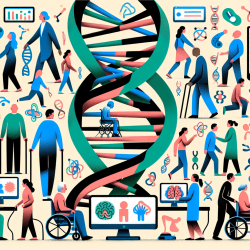The field of genetics is ever-evolving, with new discoveries shedding light on complex syndromes that affect individuals worldwide. One such discovery is the TMTC3-related syndrome, a condition linked to developmental delays and intellectual disabilities. This blog aims to provide practitioners with insights into this syndrome based on recent research findings and encourage further exploration in this area.
The Role of TMTC3 in Development
The TMTC3 gene encodes a protein involved in O-mannosylation, a process crucial for cellular adhesion. Mutations in this gene have been associated with developmental disorders characterized by intellectual disabilities (ID), seizures, and muscular hypotonia. These symptoms are often accompanied by neuronal migration defects, such as cobblestone lissencephaly or periventricular hypertopia.
A recent study explored the case of a Lebanese family with two siblings affected by severe psychomotor retardation and ID due to a homozygous pathogenic variant in the TMTC3 gene. This case highlights the importance of understanding genetic mutations and their impact on development.
Key Findings from Recent Research
- The study identified a homozygous pathogenic variant c.211C>T (p.R71C) in the TMTC3 gene in both affected siblings.
- Common clinical features among patients with TMTC3 mutations include mild-to-moderate ID and seizures.
- The phenotype varies among patients, with some exhibiting severe psychomotor delay and absence of speech.
- Truncal hypotonia is a common feature observed in most patients with TMTC3-related syndrome.
Implications for Practitioners
For practitioners working with individuals exhibiting developmental delays or intellectual disabilities, understanding the genetic underpinnings of conditions like TMTC3-related syndrome is crucial. Here are some ways practitioners can apply these findings:
- Genetic Testing: Encourage families to consider genetic testing when developmental delays are present without a clear cause. Whole exome sequencing can identify potential genetic mutations contributing to these conditions.
- Personalized Interventions: Use genetic information to tailor interventions that address specific needs related to the identified mutations.
- Collaboration: Work closely with geneticists and other specialists to develop comprehensive care plans for affected individuals.
- Continuous Learning: Stay informed about emerging research in genetics to enhance your practice and provide up-to-date care.
The Importance of Further Research
The study of TMTC3-related syndrome is still in its early stages, and further research is needed to fully understand its implications. Practitioners are encouraged to engage in ongoing education and research to better serve their patients. By staying informed about new developments, practitioners can contribute to advancing knowledge in this field.
To read the original research paper, please follow this link: A Report on a Family with TMTC3-Related Syndrome and Review.










